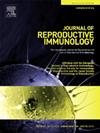Association of anti-phosphatidylserine/prothrombin antibodies with adverse in vitro fertilization outcomes
IF 2.9
3区 医学
Q3 IMMUNOLOGY
引用次数: 0
Abstract
Anti-phosphatidylserine/prothrombin antibodies (aPS/PT) are classified as non-criteria antiphospholipid antibodies (aPL), and are strongly associated with thrombosis and pregnancy complications linked to antiphospholipid syndrome (APS). This study aimed to investigate whether aPS/PT positivity is associated with adverse outcomes in vitro fertilization (IVF). The study included infertile women who tested positive aPS/PT and underwent IVF cycles, as well as infertile controls with pure tubal etiology. We compared the impact of aPS/PT on baseline and clinical characteristics, immune-related indicators, IVF laboratory metrics, and pregnancy outcomes. Women with aPS/PT exhibited lower numbers of retrieved oocytes, embryos, and both perfect and available embryos, as well as reduced rates of blastocyst formation. Furthermore, an imbalanced Th17/Treg ratio and significantly elevated serum IL-17A levels were observed in women with aPS/PT compared to controls. In conclusion, the presence of aPS/PT is associated with adverse IVF and pregnancy outcomes. Early screening for aPS/PT and appropriate consultation for couples undergoing IVF-ET should be considered. Additionally, specific immune and inflammatory mechanisms related to aPS/PT warrant further investigation.
求助全文
约1分钟内获得全文
求助全文
来源期刊
CiteScore
6.30
自引率
5.90%
发文量
162
审稿时长
10.6 weeks
期刊介绍:
Affiliated with the European Society of Reproductive Immunology and with the International Society for Immunology of Reproduction
The aim of the Journal of Reproductive Immunology is to provide the critical forum for the dissemination of results from high quality research in all aspects of experimental, animal and clinical reproductive immunobiology.
This encompasses normal and pathological processes of:
* Male and Female Reproductive Tracts
* Gametogenesis and Embryogenesis
* Implantation and Placental Development
* Gestation and Parturition
* Mammary Gland and Lactation.

 求助内容:
求助内容: 应助结果提醒方式:
应助结果提醒方式:


